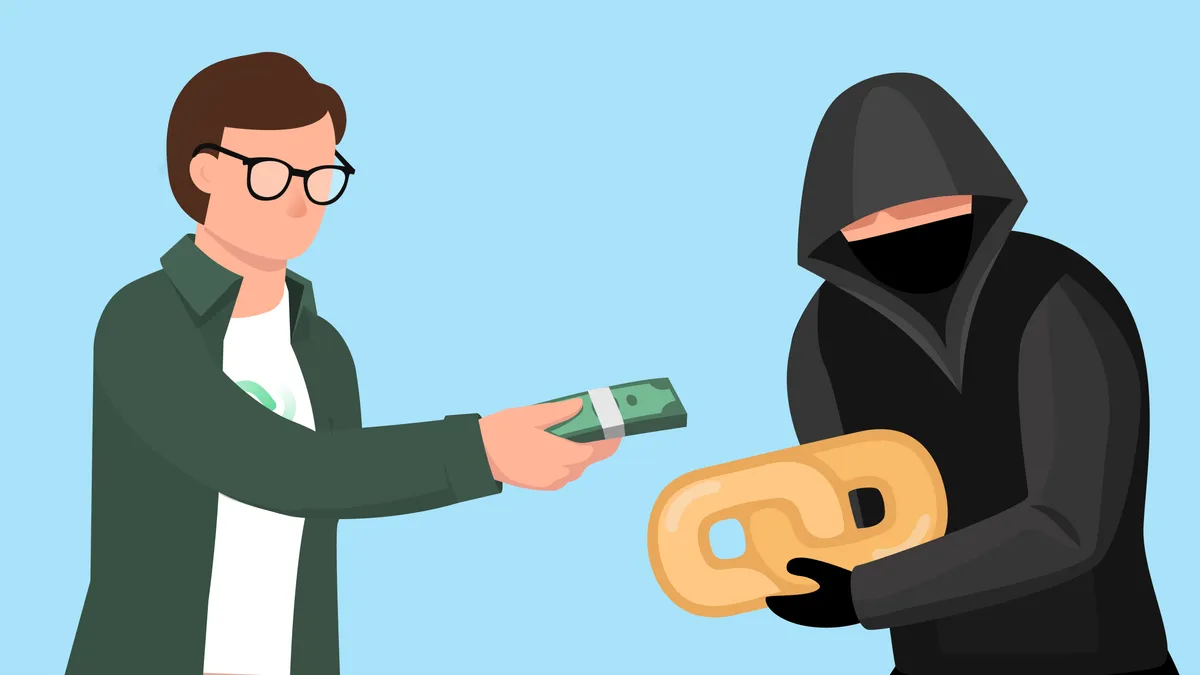
If you’ve ever dabbled in the link-building space, you’ve probably been offered the opportunity to buy links.
This is something our link-building agency encounters every day.
The first question that may come to mind is whether or not you should be buying backlinks.

When buying backlinks—if you know what you’re doing—you can reap the rewards of organic traffic, increased search results, and improved search engine rankings.
Get it wrong, however, and you could simply be lining a site owner’s pockets without any tangible results.
Many search engine optimization (SEO) professionals believe buying backlinks isn’t the best option available. Others argue that it’s an effective backlink strategy.
What we're going to look at
- What buying backlinks involves.
- How to buy backlinks the right way.
- How to work with site owners to secure bought links.
- Sponsored content and what it means for your brand.
What Is Link Buying?
The premise of buying links is quite simple. A site owner will agree to place your backlink on their website at a price.
Having this link in your backlink profile will supposedly boost your organic traffic and help you achieve better search rankings in Google’s search results.
While this is the dream, it’s not always achievable, especially if you use black-hat SEO tactics like link schemes.
If you go the white hat route by acquiring paid links on high-authority sites by creating quality content, you have a better chance of making bought links work for you.
Should You Buy Backlinks?
There is no simple yes or no answer to this question.
However, we believe you’re missing out on external links from many high-quality, relevant websites if you outright refuse to pay for any backlinks.
In some industries, paid backlinks are the only way to achieve backlink placements.
You can absolutely guarantee that international, multi-million dollar businesses in the insurance, casino, and finance industries are all buying large amounts of links.
With that said, paid link-building methods need to be carried out carefully and should add value to readers.
We've compiled a video guide below that analyzes the various considerations when buying links.
Google's Stance
One of the main things you’d want to avoid when building links is to be penalized by Google for unnatural links.
For this reason, it’s important to know Google’s stance on paid links, as you don’t want to step out of line.
Google doesn’t want you to buy backlinks. The search engine doesn’t like any artificial methods of gaining links.

Google explicitly warns in its Webmaster Guidelines that it considers buying or selling links a link scheme.
Technically, you shouldn't buy links if you want to stick to Google’s guidelines.
Despite this warning, buying and selling links are incredibly common practices. Many SEO professionals do it, and nowadays, Google has seemingly given up on punishing people for buying links.
Instead, they simply devalue links they think are part of a link scheme.
Why SEO Professionals Buy Backlinks
Five years ago, it was possible to gain many free links simply by using the infamous SkyScraper technique.
What Is the SkyScraper Technique? 🤔
The SkyScraper technique is a link-building method where you take existing content from your competitors and improve it significantly.
By creating this type of content, you are developing opportunities for other sites to link to your content.
We built over 50 links in one month for some of our clients in 2016 and 2017. Today, this is extremely difficult unless you knock it out of the park with a viral piece of content and an amazing brand.
The reason is simple, many website owners now understand the value of links.
If you ever perform link outreach, you’ll discover that many website owners will only post a link if you pay them.
The truth is that most website owners have realized that they can earn significant revenue from selling links, and that makes it difficult to get links without offering payment.
How Much Do Backlinks Cost?
Now that you know buying backlinks isn’t necessarily a bad practice, you may want to know what these links cost.
We’ve put together a complete guide regarding the cost of backlinks, but here is a simple breakdown:
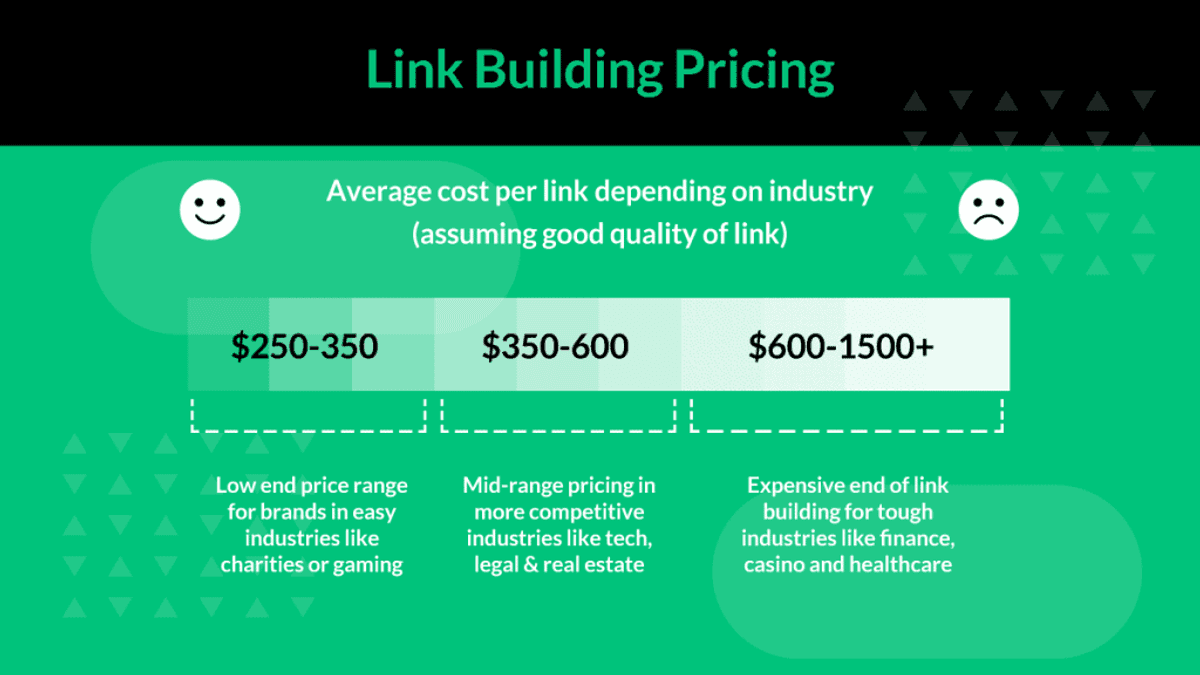
Why Charge for Backlinks?
As mentioned above, website owners charge for backlinks because they know how valuable these links are to businesses like yours.
It also takes time and effort to place a link on a website. Website owners think it is only fair to be compensated for the value they provide.
One example of a site owner who might charge you to place your backlink in their content is bloggers.
If you've ever read an 'income report' from a popular blogger, you'll notice that 'sponsored posts' make up a huge proportion of their revenue.
We've seen cases where bloggers earn upwards of $15,000 per month selling backlinks.
What Is a Blogger Income Report?
Blog income reports display how much revenue a blog is making as a result of sharing affiliate links, web hosting commissions, and sponsored posts.
Examples of Bloggers Selling Backlinks
Here are some examples of popular bloggers who report massive income streams from essentially selling links, which always fall under the category of 'sponsored posts'.
Fitmommyinheals.com
This blogger earned over 80% of her revenue through sponsored posts:
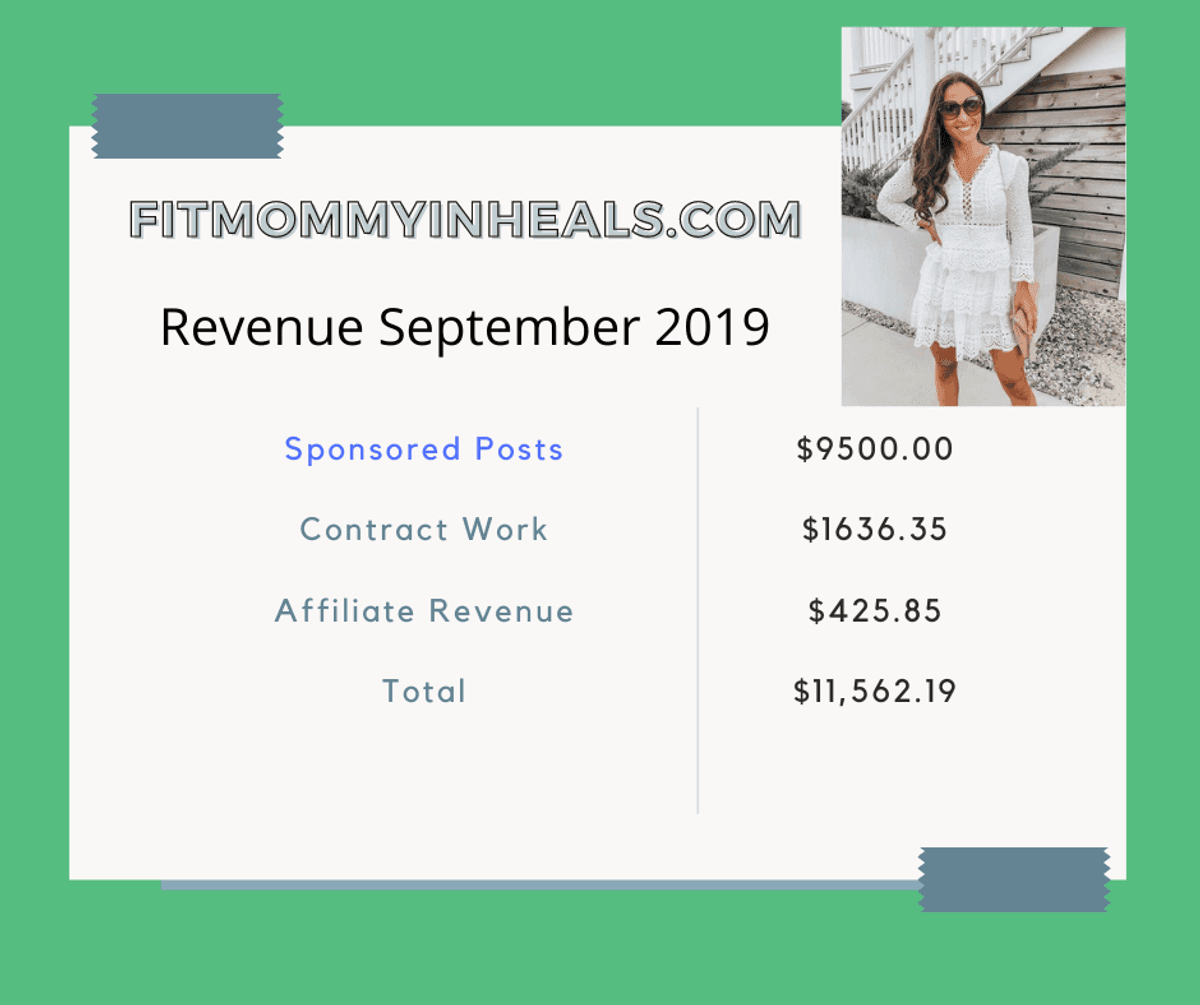
Wanderluststorytellers.com
The highest single earner for this family of travel bloggers in March 2017 was sponsored posts:
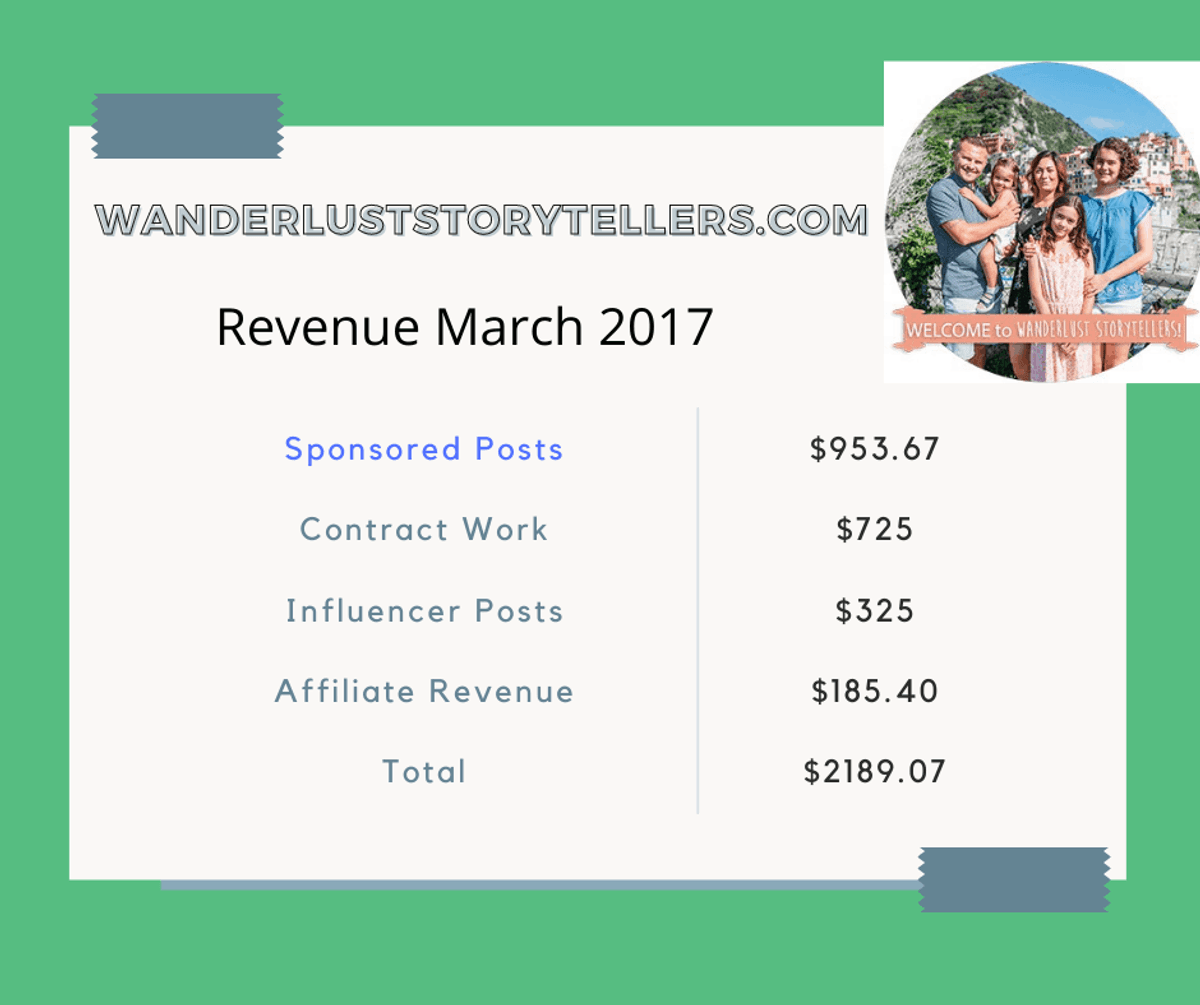
Fitnancials.com
This personal finance and money blogger revealed that she earned $4,612, with her biggest driver of income being sponsored posts:
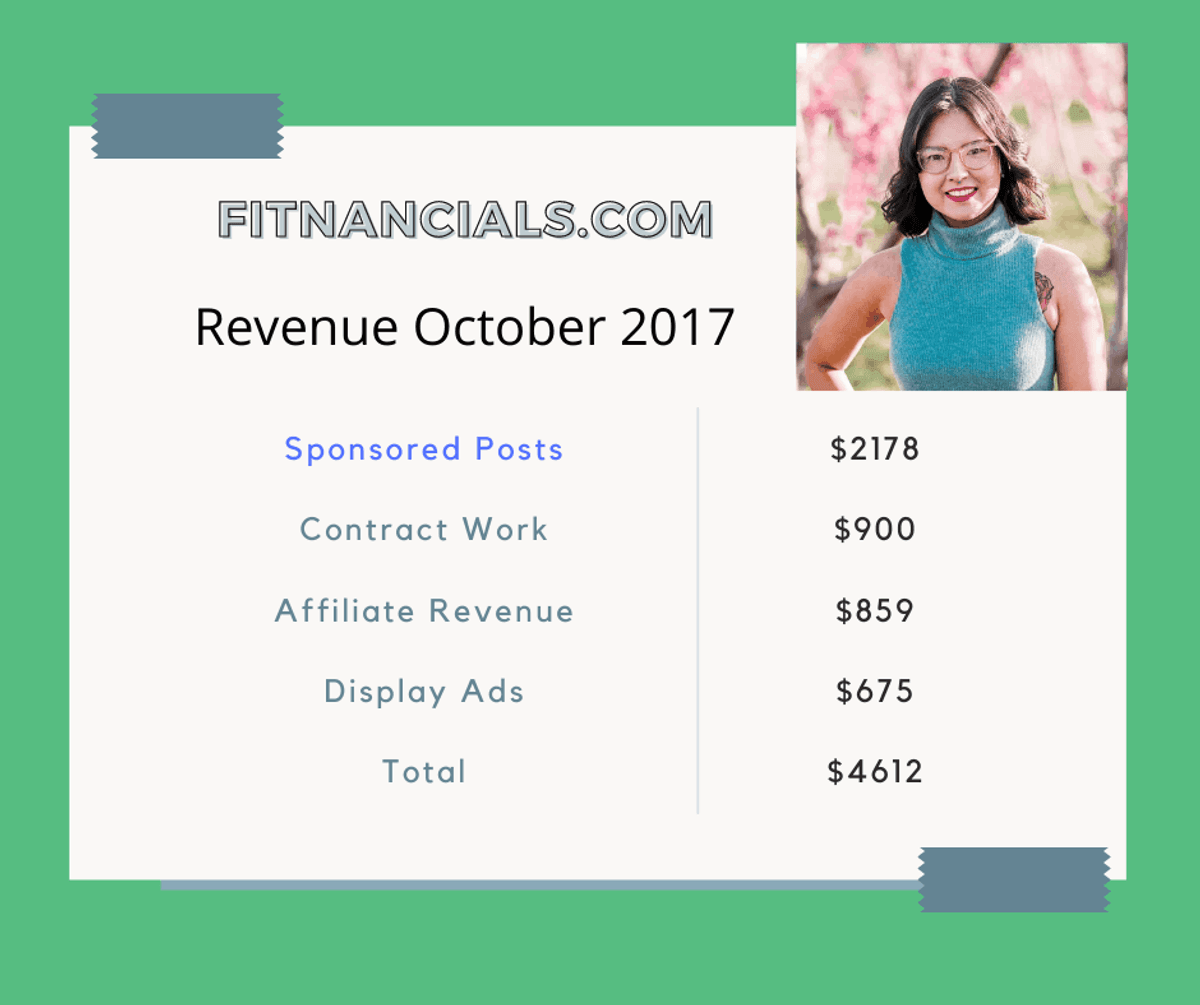
The above makes the incentive very clear.
Bloggers and content websites rely on the link-building industry to make an income and—in many cases—to fulfill their dream of working remotely as a digital nomad.
Additionally, buying and selling backlinks are especially common in some ultra-competitive niches. For example, industries like finance and gambling.
It’s not hard to see why, based on the financials above.
Every link a website places in its content passes PageRank on to the other site. This increases the chances that the site they link to will rank for competing keywords, making their own SEO efforts more difficult.
What Is PageRank? 🤔
This is an algorithm implemented by Google to assist them in determining the overall authority of a web page and the website.
PageRank is a score between 0 and 10 that gets assigned to a website based on its relevance and value to users.
Ultimately, whether you choose to buy backlinks will depend on how you view the above points.
You’ll have to consider how fast you want to grow, as well as how risk-averse you are.
The Risks of Buying Backlinks
There are two main arguments against buying backlinks.
❌ You might waste your money. Buying links on directories or forums probably won’t hurt your site, but it will have little to no impact on your ranking. That’s because Google’s algorithm knows to ignore this type of link.
❌ You might receive a manual action from Google. This is when a human reviewer decides that your site or pages on your site are not compliant with Google’s guidelines. This can result in your website traffic plummeting and can be very hard to bounce back from. You may even see your site completely removed from Google.
However, manual actions related to link spam are extremely rare nowadays. Google is simply getting better at just ignoring any spam or low-quality links.
How to Buy Backlinks? Not All Methods Are Equal
There are many methods of buying links. Some of them are definite no-gos, but others aren’t quite so black and white.
Here is a look at some common ways to buy backlinks and the risks and rewards of each one.
Link-Buying Methods:
❌ Not a good link-buying method.
🟠 A link-buying method that is worth investigating but may not be the best idea.
✔️ A great link-buying method.
❌ Spammy Services on Freelance Marketplaces
The first way to buy backlinks that most new site owners come across is through services offered on freelance websites like Fiverr or PeoplePerHour.
There may be good link-building services available on these sites, but there are also plenty of those that sell bad backlinks.
Here's an example from one of the many low-quality sellers on PeoplePerHour:
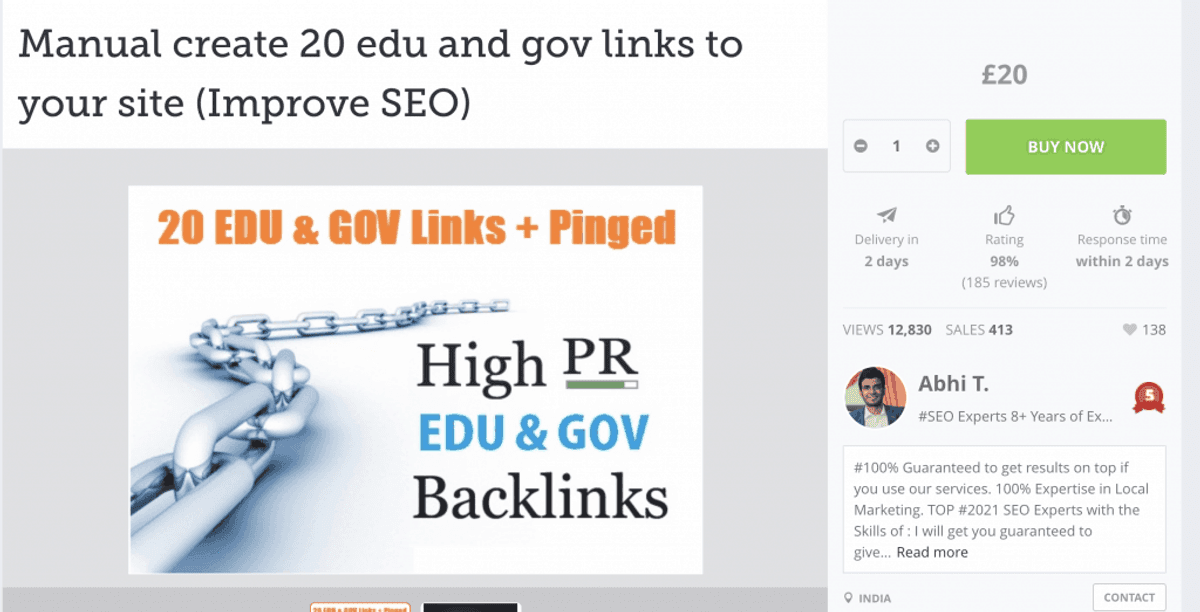
Bad link-building services typically offer a large number of backlinks for a low price. They may even claim to create white hat links or provide big ranking increases.
Ensure you know what you are signing up for before deciding on one of these services. If the deal seems too good to be true, it almost certainly is.
This is because proper backlink building takes time, can be expensive, and has no guarantees.
A typical white hat campaign involves:
✅ Creating a backlink strategy.
✅ Conducting outreach to suitable websites.
✅ Negotiating with site owners.
✅ Creating high-quality content.
Any service that offers many links for a low cost is most likely taking shortcuts. Avoid these offers if you want to buy quality backlinks.
Beware of PBNs
Often, the people running these freelance services will have access to a private blog network (PBN), which is a network of websites they own that they can easily place links on.
This black hat link strategy allows them to generate a specific number of links with little time or effort.
The issue is that search engines hate PBNs. Buying links from this type of website can destroy your rankings.
Low-quality links
Other ways these freelance services generate links is through automatically generated content like blog comments or forum links. Or they may build low-quality links on directory sites.
Whatever their exact method, these are link-buying strategies you want to avoid.
🟠 Niche Edits
Niche edits are a strategy for buying links where you reach out to website owners that sell links and ask them to link to a relevant page on your website.
The upside
Niche edits are a good strategy to buy quality backlinks because you can:
✅ Choose the websites you reach out to.
✅ Generate backlinks to pages that don’t typically attract links.
✅ Generate backlinks quickly.
✅ Choose your anchor text.
It’s also hard for Google’s algorithm to spot this type of backlink. It’s tough to differentiate a niche edit link from an organic one, as long as you and the website owner are careful.
The downside
You must be vigilant about the types of sites you pay for links.
If a website owner is willing to link to your site for cash, how many other websites do they have the same agreement with?
While websites can typically accept paid links without search engines noticing, they risk Google’s algorithm regarding them as a link farm if they do it too many times.
Being associated with one of these sites can negatively affect your search engine ranking.
We recommend thoroughly analyzing any website on which you plan to pay for niche edit links. This will ensure you only buy quality backlinks.
High vs. low-quality sites for niche edits
We’ve spoken about how to differentiate between low and high-quality websites before. Here are the main points to consider:
Domain metrics alone don’t tell you if a site is high quality. Plenty of sites used in PBNs are built on domains that already have a high domain authority (DA), which is a metric for the relevance of a website to a specific niche.
A website’s content and traffic are the biggest indicators of quality. Look for a site with a good design, original articles, a clear topic, and a few posts marked as “Guest Author.”
Transparency about who owns and operates the site is also important. Look for an “About” page with detailed information.
Look for sites that generate consistent, quality traffic from Google. A downward trend, sudden drops, spammy keywords, or low traffic all suggest a site isn’t worth getting a backlink from.
🟠 Paid Guest Posts
Paid guest posts are when you pay money to place an article on a website.
This strategy has many of the same benefits as niche edits.
You can choose the website, the content you link to, and the anchor text. It’s a good way to buy high-quality backlinks.
Paid guest post on a pet niche blog
Here's a common example of the kind of response you might get from a blogger who's looking to earn some revenue from your guest post request:
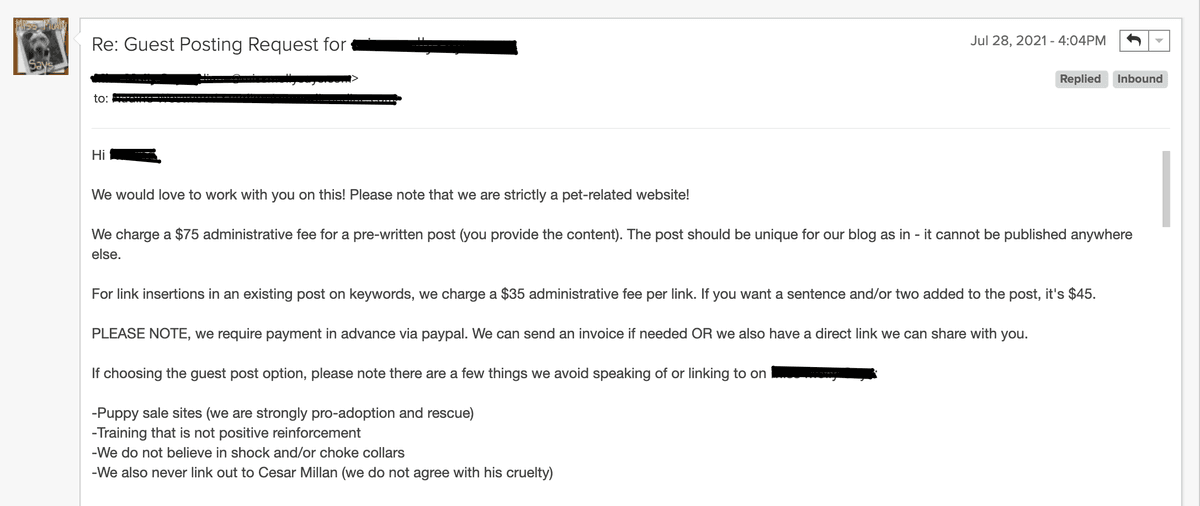
This site has fantastic metrics, gets lots of relevant traffic, and they're happy to receive revenue from it even though they’re strict about the content they publish.
In this particular instance, it will be a great option if you want to build links to any pet-related website.
The downside is the same as niche edits, too. If you place a guest post on the wrong site, you could get punished by Google.
Paid guest posts and niche edits
For these methods, you have to create the article yourself. This will either add to your costs if you choose to outsource or take up time if you choose to write the post yourself.
On a more positive note, when looking for paid guest posts, you might also find sites that won’t charge you in many cases, especially if you have a history of creating great quality content.
❌/🟠/✔️Paying an Agency
Paying an agency is slightly different from the other link-buying methods on this list.
This is because you are paying someone to build backlinks for you rather than paying for the backlinks themselves.
There is nothing wrong with hiring backlink builders, in our opinion. It’s no different from paying people to write content, design your website, or manage your SEO strategy.
What can make a difference, however, is how the agency you hire chooses to build links.
If the service spends your budget on PBN links, you’re at risk of getting a Google penalty.
But if it generates quality links through organic means like outreach or PR, you have nothing to worry about.
How can you tell a good agency from a bad one?
Of course, you’ll want to choose the best agency to carry out your link building so that you don’t run the risk of a penalty.
We suggest following these steps to find the right agency for you:
✅ Discuss with the agency how they build backlinks. Find out the strategies they use before committing.
✅ Look at their link-building case studies: These will show previous sites they have worked with and the results they have achieved. Check for specific details, as anyone can make up an anonymous case study.
✅ Check out their website. If the website has lots of good links and plenty of traffic, it suggests they know what they are doing.
✅ Read their testimonials and user reviews online: A history of happy clients is a good sign.
✅ Find out whether they use paid links. You can then make an informed decision about whether this is something you are comfortable with.
Try to avoid link-building services with these red flags:
❌ Suspiciously low prices: Link building is expensive, and the agency’s prices should reflect this. Avoid cheap backlinks.
❌ Guaranteed results: There are no guarantees in link building. If a service promises a certain number of links from specific sites, it suggests they are using a PBN.
❌ Fast links: We find that professional backlink building takes anything from a couple of weeks to a month to start generating results.
✔️ Sponsored content
Sponsored content is one way to buy links that is completely safe. It involves paying to place a sponsored blog post on websites.
This differs from guest posts in that the website owner will make it clear that the post is sponsored and give the link a rel=“sponsored” or rel=“nofollow” tag.
This is a tag that tells Google’s algorithm that you paid for the post. It also stops the post from passing on PageRank.
Unfortunately, this makes these links far less valuable than regular follow links.
Types of Link Tags
➡️ Rel=“sponsored”: This tag specifies that a link has been paid for. It tells the Google bots not to crawl the link.
➡️ Rel=“nofollow”: This tells the Google crawlers not to crawl the link. You can also use it for sponsored posts instead of rel=“sponsored”
With sponsored posts, you may generate traffic from the website, and you will increase your brand exposure.
You can also be featured in large publications that don’t typically offer guest posts. This exposure may result in other websites sending follow links to your website.
A Site’s Quality Is the Most Important Factor
Whether you should buy backlinks or not depends entirely on the quality of the site you want to get a link from.
This applies to all types of link building, not just link buying.
Google and other search engines can’t know for sure whether a link is paid for or not. All they have are hints that suggest a site is receiving money for links.
If the search engine decides it doesn’t like a site that links to yours, you’re at risk of a penalty whether or not you’ve paid for a link.
Similarly, if you pay for 20 links on sites that search engines like, you’re unlikely to have any problems.
Before paying for any link you should carefully analyze the website in question.
Look for high-quality original content, transparency about who owns or operates the site, how much traffic it receives, and whether it has an engaged audience.
If the site you want a link from meets these criteria, you can consider paying for a link. If it doesn’t, you should avoid it.
Wrapping Up on Buying Backlinks
As mentioned before, there is no clear-cut answer as to whether or not you should buy backlinks.
However, there are several things you can do to ensure you’re getting the best paid links and avoid a Google penalty.
If you’re looking for a professional link-building agency with experience in paying for links, as well as many other white hat backlink-building tactics, check out our website and case studies.
Get in touch via our website to find out why we are the trusted agency for over 300 brands for both paid backlinks and our 20 other link-building strategies.


